- Home
- Matt Rogers
Hunted: A Jason King Thriller (Jason King Series Book 6)
Hunted: A Jason King Thriller (Jason King Series Book 6) Read online
Hunted
A Jason King Thriller
Matt Rogers
Contents
Reader’s Group
Books by Matt Rogers
Chapter 1
Chapter 2
Chapter 3
Chapter 4
Chapter 5
Chapter 6
Chapter 7
Chapter 8
Chapter 9
Chapter 10
Chapter 11
Chapter 12
Chapter 13
Chapter 14
Chapter 15
Chapter 16
Chapter 17
Chapter 18
Chapter 19
Chapter 20
Chapter 21
Chapter 22
Chapter 23
Chapter 24
Chapter 25
Chapter 26
Chapter 27
Chapter 28
Chapter 29
Chapter 30
Chapter 31
Chapter 32
Chapter 33
Chapter 34
Chapter 35
Chapter 36
Chapter 37
Chapter 38
Chapter 39
Chapter 40
Chapter 41
Chapter 42
Chapter 43
Chapter 44
Chapter 45
Chapter 46
Chapter 47
Chapter 48
Chapter 49
Chapter 50
Author’s Note
Afterword
Reader’s Group
About the Author
Copyright © 2017 by Matt Rogers
All rights reserved.
Join the Reader’s Group and get a free Jason King book!
Sign up for a free copy of ‘HARD IMPACT’.
Experience the most dangerous operation of King’s violent career.
Over 150 pages of action-packed insanity in the heart of the Amazon Rainforest.
No spam guaranteed.
Just click here.
Books by Matt Rogers
THE JASON KING SERIES
Isolated (Book 1)
Imprisoned (Book 2)
Reloaded (Book 3)
Betrayed (Book 4)
Corrupted (Book 5)
Hunted (Book 6)
“A mighty flame followeth a tiny spark.”
Dante
1
Somewhere over the Kamchatka Peninsula
Russia
The twin cockpits of the Mil Mi-28 “Night Hunter” attack helicopter were both laced with the kind of silent tension that only materialised in sensitive circumstances.
Sergei Vasiliev sat in the hard metal seat assigned to the weapons officer. He rolled his calloused hands over one another and peered out of the reinforced windscreen at the swirling darkness beyond. It had been years since his employers had sent him to the Russian Far East — ordinarily, the only purpose the region served was to disintegrate long-abandoned infrastructure with its raging storms.
A desolate wasteland, by all appearances.
Yet here he was, sitting amidst the cockpit’s uneasy quietness, being piloted at maximum speed toward a remote fishing village tucked into the coastline. He had received painstakingly specific instructions, which he was to adhere to at any cost. His employers were men of unimaginable wealth and power. Sergei had no comprehension of the true nature of their status — he only paid attention to the cheques he received from offshore accounts.
The cheques were large enough to justify anything his employers wanted.
Sergei scanned the console less than a foot from his face, noting the controls to each of the attack chopper’s weapons in turn.
A 30mm Shipunov 2A42 autocannon, mounted on the front.
Thermobaric-variant Ataka missiles designed for use in urban environments, resting in missile trays underneath each wing.
The armament didn’t end there, but he erased the rest of the firepower from his mind. It wouldn’t be needed. He kept his hands in his lap, away from the controls. Any use of the weaponry wasn’t necessary.
Yet.
There were questions that needed to be answered first.
Sergei had yet to speak a word to the man in the pilot’s cockpit above and behind him. By all accounts, the solemn man had been plucked out of the Russian Air Force on short notice and instructed to obey Sergei’s every wish until the task had been completed. The two had met at a private airfield on the very edge of the Eastern-Siberian region and wordlessly set about their business.
Sergei hadn’t required a crash course in aviation.
Five years as a Russian Marine Commando — the equivalent to the U.S. Navy SEALs — had provided everything he needed to know.
It certainly looked good on his résumé.
The Mi-28 dipped below the layer of heavy clouds and the Far East coastline revealed itself. To a youthful eye, it would seem like the edge of the world — a twisting, uneven line that dropped off into the dark waters of the North Pacific Ocean.
The fishing village appeared as a weak artificial fleck of light amidst the darkness, barely perceptible from their altitude. It was the only sign of civilisation for as far as the eye could see. Sergei felt the nose of the chopper dip as the pilot began the descent. His stomach dropped and his senses heightened. The long journey was coming to a close.
Soon, his boots would touch flat ground.
He knew the pilot had been informed of what would shortly take place, which was likely the reason for the reserved silence that permeated the chopper’s interior.
The man was no doubt sickened by the grim orders.
Sergei, on the other hand, felt nothing.
He rolled his neck from side-to-side, listening to the bones pop in turn. There was no mercy out here — what he had to do bothered him no more than an hour of overtime bothered a shift worker. His unease came from the knowledge that his employers were disgruntled, not from the nature of the task he had been instructed to carry out.
The Mi-28 touched down on a potholed dirt road a couple of miles away from the ocean. The pilot shut off the twin turboshaft engines and the rotors powered down. Their mechanical roar faded into sheer quiet.
Sergei wrapped a gloved hand around the release lever to his cockpit’s exit door.
‘Wait here,’ he said.
‘I know,’ the pilot said quietly.
Sergei pushed the door open and swung out of the cockpit, slotting the toe of his boot into one of the footholds fixed into the exterior. He shut the door behind him and dropped to the dirt, landing like a cat on the soft earth.
They had touched down in the residential sector of the fishing village — a spacious grid of twisting dirt trails home to traditional cottages with sloping roofs and orderly yards. The residential dwellings were a little more modern than the archaic rural villages that dotted the peninsula further inland.
Clearly, the fishing industry provided a level of income slightly higher than most in this region.
It still left the residents close to poverty.
Sergei couldn’t understand why people lived like this. He found no appeal in the isolation.
He crossed the road and approached the target destination with measured caution. The cottage had already been secured, but one could never be too careful. It was a large building, likely one of the most spacious dwellings in the village — rectangular in shape and made of logs. Sergei stepped up onto the wooden front deck and halted in front of the thin door.
He knocked once and clasped his hands behind his back. There was no firearm betw
een his fingers. The MP-443 Grach handgun that he carried on his person at all times was slotted into a holster on his rear waistband.
He expected no confrontation.
At the first sign of trouble, he would have the gun drawn in a heartbeat.
But he needn’t have worried.
The door was opened by an expressionless man in his mid-forties wearing cold-weather tactical gear and carrying a Kalashnikov AK-12 assault rifle on a leather strap over his shoulder. Sergei didn’t know him, but he’d been told exactly who he would be meeting. He glanced past the man — into the cottage — and spotted a second soldier dressed in identical kit sitting on one of the frail chairs against the opposite wall.
Their eyes met.
Sergei nodded approvingly.
Two men was what he had been expecting.
Two men was what he saw.
‘You got it done?’ Sergei said to the man who had answered the door, speaking Russian.
The guy nodded slowly. ‘Six of them. What are you here to do?’
‘Ask them some questions.’
‘What questions?’
Sergei fixed him with an icy glare. ‘We’re each told exactly what we need to know. Don’t get curious.’
The man relented and stepped aside to let him pass.
Sergei stepped into the cottage, which was actually a single giant room home to a kitchen, living quarters and a frail wooden bed in the corner. He fixed his gaze on the six villagers spread out across the wooden floor. Their wrists and ankles were hog-tied with crude leather straps. Gags were fixed across their mouths. Despite the chill, they were all sweating. They stared at the newcomer with unmistakeable fear in their eyes.
Sergei shut the door behind him and paused to survey the scene. The cabin smelt of sawdust and body odour. It had electricity, at least — two halogen bulbs were fixed into the ceiling. They were weak, casting broad shadows over much of the room.
He turned to the soldier beside him. ‘Which one gave them the boat?’
The soldier signalled to the closest man — a weary, weather-beaten fisherman still dressed in work clothes. The jacket and jeans were frayed and dirty from a long day of physical labour. The whispers of thin hair atop his head were matted to his scalp. He wore boots caked thick with mud — the soldiers must have dragged him in from outside after subduing him.
Sergei crouched down in the lowlight and ripped the gag off the fisherman. The fabric tore under his grip. Despite his small stature, Sergei was a strong man — strong enough to impose fear in almost anyone who faced his questions. Over a decade of Brazilian jiu-jitsu had provided him with the strength of a bull.
‘You gave one of your vessels to a group of men who came down from the peninsula?’ he said.
The fisherman offered no resistance. ‘Yes.’
‘Why did you do that?’
‘They offered me a vehicle in return. I thought it might be useful for my business, and the boat was falling apart as it was. I was no longer using it.’
‘The all-terrain vehicle, you mean?’
‘Yes.’
‘The vehicle that had clear markings on its chassis of well-known Russian military insignia?’
A pause.
‘These men that you helped were not Russian military,’ Sergei said. ‘That would have been clear as day. And you let them escape out to sea?’
The fisherman paled, squirming uneasily against his restraints. ‘It was suicide for them. I knew that… I let them take the boat because I knew it would fail them.’
Sergei cocked his head. ‘How so?’
‘There was a storm,’ the fisherman said. ‘Very bad. They wouldn’t have lasted ten minutes.’
‘They didn’t have to. We found the boat — or what was left of it. It was empty.’
‘They drowned.’
‘I’m afraid not. There were American military harnesses on deck. They were extracted. They got away.’
The fisherman did not respond. ‘Please… I didn’t know.’
‘That’s not what I’m here for,’ Sergei said. ‘I’m here for details.’
‘Details…?’
‘How many were there?’
‘Seven.’
Sergei slipped a folded piece of paper out of a pocket in his khakis and displayed its contents to the fisherman. ‘Was this man one of them?’
A grainy screenshot from a surveillance feed had been printed on the paper, zoomed in on a large, well-built man standing on a metal walkway in some kind of underground cavern. The fisherman squinted as he scrutinised the image.
‘Yes,’ the man said. ‘He was there.’
Sergei sighed, scrunched up the paper and dropped it on the floor. ‘I thought as much. He’s the one we’re interested in.’
‘I’m sorry.’
‘I hope you are,’ Sergei said. ‘Because now I have to do this…’
He rose off one knee and strode back across the room. The soldier by the door regarded him with an inquisitive glance. ‘What now?’
‘You’re certain this is everyone who saw them?’ Sergei said in a low tone.
‘Yes,’ the soldier said. ‘Like the man said, there was a bad storm. This group were unloading their supply. Everyone else was indoors.’
‘Okay. Wait here. You’ll be contacted with further instructions.’
The tension that settled over the room didn’t bother Sergei. The two soldiers were likely wondering whether they would be ordered to kill the civilians themselves.
Maybe they weren’t ready for such drastic measures.
Sergei nodded curtly to the both of them, then exited the room as abruptly as he had entered less than a minute previously.
The soldier slammed the door behind him, likely frustrated by the lack of clear information the visitor had provided.
Sergei ignored the brazen move. He had everything he needed.
The American is alive. My employers are vulnerable.
He made for the Mi-28 still resting motionless on the dirt road. It poised there like a watching hawk, awaiting his return. He glanced back at the cabin every dozen or so steps, each time ensuring that no-one had emerged from the front door. While inside, he’d confirmed that the front door was the only way in or out of the building.
He ascended the same path into the cockpit of the weapons officer and dropped with resigned acceptance into the seat.
‘You found what you needed?’ the pilot said. His voice came out barely above a whisper, laced with the expectations of what might come next.
‘Yes.’
‘Are those measures I was told of necessary?’
‘Yes.’
The pilot sighed. With a grunt of disapproval, he powered up the chopper. He spent a moment fidgeting with a digital screen before flashing a signal to the cockpit below him. ‘They’re all yours.’
His voice was drowned out by the roar of the five-blade main rotor screaming to life. The Mi-28 lifted off the ground and swooped low over the dirt track. Its movements were precise. The pilot guided the nose of the chopper expertly around to face the cabin.
Sergei seized control of the Shipunov autocannon and unleashed a hail of gunfire upon the building.
The small house was torn to shreds almost instantly. High-explosive incendiary rounds destroyed the old walls like they were paper. Each round of ammunition was set to a one-second fuse delay, after which the explosives detonated in spectacular fashion.
Sergei felt the raw power in his hands. In seconds the roof of the cabin imploded, all its walls demolished by the chest-pounding vibrations of the explosions. For good measure, he fired a single thermobaric Atakar missile into the burning rubble.
A vicious shockwave rocked the Mi-28 in the air, thrust outward from the intense explosion. The cabin vanished entirely, disintegrated by the barrage of attacks. Sergei registered the smouldering rubble and scorched earth surrounding the building and nodded once.
The pilot noted Sergei’s satisfaction and worked the controls, twisting th
e chopper away from the scene. The Mi-28 set off back the way it had come. According to Sergei’s digital wristwatch, they had spent two and a half minutes on the ground.
In and out.
Job completed without a problem.
Despite that, the knot in his gut tightened. The news had not been good. An American soldier had successfully made it out of Russia alive, potentially in possession of information that would be disastrous to a number of his employers.
He had a long, hard road ahead.
Drastic measures would have to be taken.
He bowed his head as the attack helicopter rocketed back over the peninsula, fully aware that there would be hell to pay for Vadim Mikhailov’s incompetence.
2
Jason King crawled out of a murky haze, administered by a cocktail of opioids. He blinked hard, momentarily confused. There was always a delay in returning from unconsciousness — a disconnect that had to be overcome.
The harsh white light overhead drummed into his eyeballs, kicking off a dull throbbing in the back of his head. The sensation was numbed by some kind of drug — he guessed morphine — but certain injuries were distinctly noticeable.
His nose was a swollen mess — the sensation of the broken bones overpowered even the strong painkillers. His left wrist had puffed up beyond recognition, like a ripe pumpkin ready to burst. He was dressed in a cheap hospital gown and covered in a couple of layers of white blankets.
The steel gurney he rested on was positioned in the centre of a sterile room with metal walls and a metal floor. The space was utilitarian, almost entirely devoid of furniture. There were two empty beds opposite his, and a steel workstation in the corner that had been wiped down recently.
He moved to sit up. Something bit around his chest, halting him in his tracks. He glanced down and grunted in frustration.
Two leather straps were fastened across his torso, effectively trapping him on the gurney. Then he noticed his right wrist had been handcuffed to the steel railing running the length of the bed.
A precautionary measure, no doubt.

 Nature and Blight
Nature and Blight The Wolves of Third Clan
The Wolves of Third Clan Ghosts
Ghosts Bear
Bear The Will Slater Series Books 1-3
The Will Slater Series Books 1-3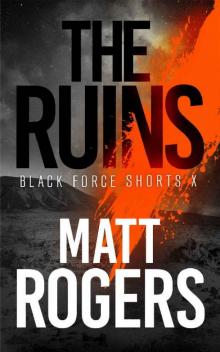 The Ruins
The Ruins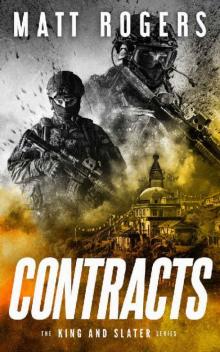 Contracts
Contracts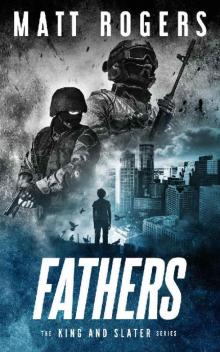 Fathers
Fathers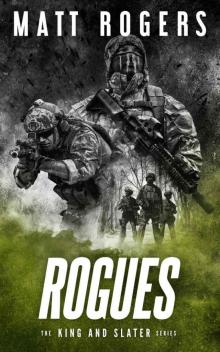 Rogues: A King & Slater Thriller
Rogues: A King & Slater Thriller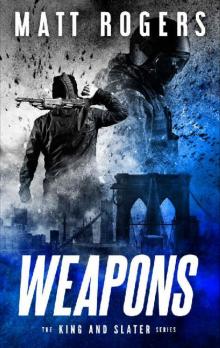 Weapons
Weapons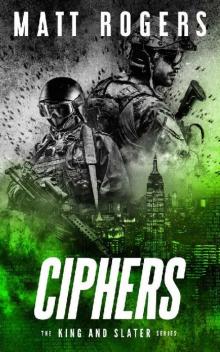 Ciphers
Ciphers Lynx
Lynx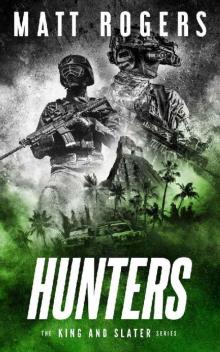 Hunters
Hunters Of Superior Design
Of Superior Design The Hidden: A Black Force Thriller (Black Force Shorts Book 4)
The Hidden: A Black Force Thriller (Black Force Shorts Book 4) Blood Money
Blood Money The Hidden_A Black Force Thriller
The Hidden_A Black Force Thriller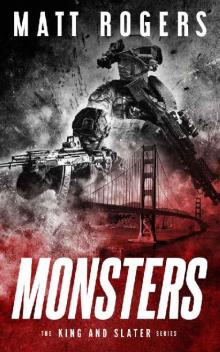 Monsters
Monsters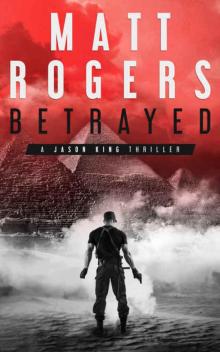 Betrayed: A Jason King Thriller (Jason King Series Book 4)
Betrayed: A Jason King Thriller (Jason King Series Book 4)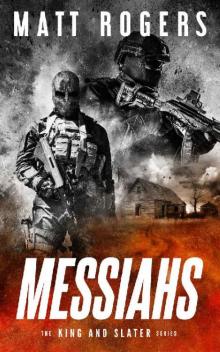 Messiahs
Messiahs The Wicked_A Black Force Thriller
The Wicked_A Black Force Thriller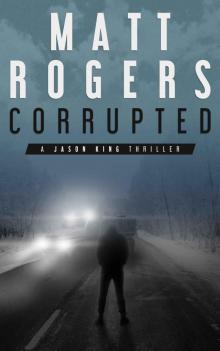 Corrupted: A Jason King Thriller (Jason King Series Book 5)
Corrupted: A Jason King Thriller (Jason King Series Book 5) The Jason King Series: Books 1-3
The Jason King Series: Books 1-3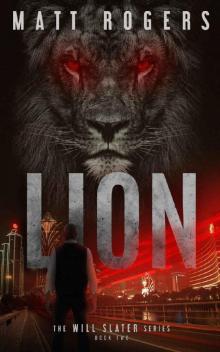 Lion
Lion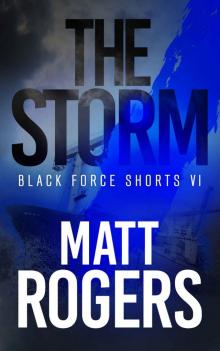 The Storm: A Black Force Thriller (Black Force Shorts Book 6)
The Storm: A Black Force Thriller (Black Force Shorts Book 6)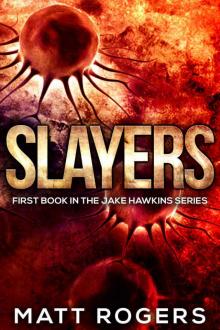 Slayers (Jake Hawkins Book 1)
Slayers (Jake Hawkins Book 1) Warrior: A Jason King Thriller (The Jason King Files Book 2)
Warrior: A Jason King Thriller (The Jason King Files Book 2)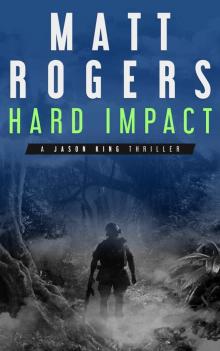 Hard Impact: A Jason King Operation (Jason King Series Book 0)
Hard Impact: A Jason King Operation (Jason King Series Book 0) The Wicked: A Black Force Thriller (Black Force Shorts Book 7)
The Wicked: A Black Force Thriller (Black Force Shorts Book 7) Warrior_A Jason King Thriller
Warrior_A Jason King Thriller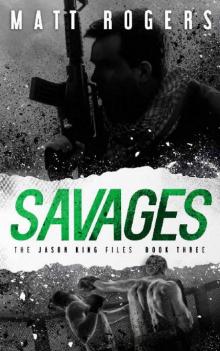 Savages: A Jason King Thriller (The Jason King Files Book 3)
Savages: A Jason King Thriller (The Jason King Files Book 3)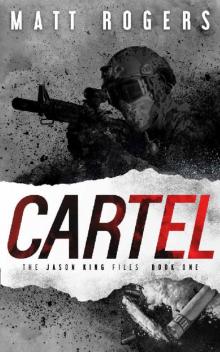 Cartel: A Jason King Thriller (The Jason King Files Book 1)
Cartel: A Jason King Thriller (The Jason King Files Book 1)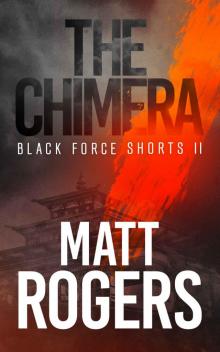 The Chimera_A Black Force Thriller
The Chimera_A Black Force Thriller The King: A Black Force Thriller (Black Force Shorts Book 8)
The King: A Black Force Thriller (Black Force Shorts Book 8)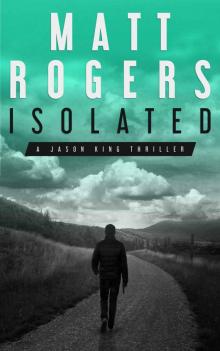 Isolated: A Jason King Thriller (Jason King Series Book 1)
Isolated: A Jason King Thriller (Jason King Series Book 1) The Victor: A Black Force Thriller (Black Force Shorts Book 1)
The Victor: A Black Force Thriller (Black Force Shorts Book 1)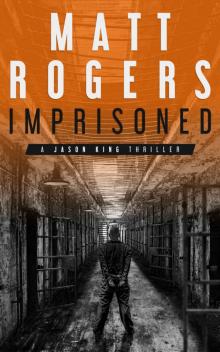 Imprisoned: A Jason King Thriller (Jason King Series Book 2)
Imprisoned: A Jason King Thriller (Jason King Series Book 2)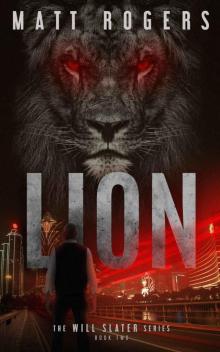 Lion: A Will Slater Thriller (Will Slater Series Book 2)
Lion: A Will Slater Thriller (Will Slater Series Book 2)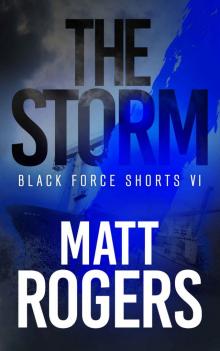 The Storm_A Black Force Thriller
The Storm_A Black Force Thriller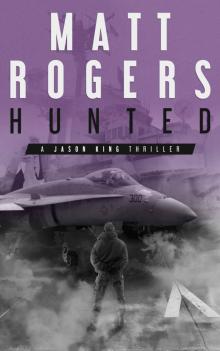 Hunted: A Jason King Thriller (Jason King Series Book 6)
Hunted: A Jason King Thriller (Jason King Series Book 6)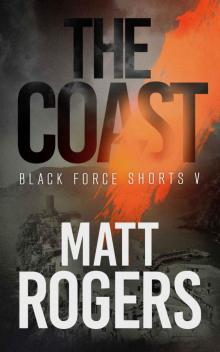 The Coast: A Black Force Thriller (Black Force Shorts Book 5)
The Coast: A Black Force Thriller (Black Force Shorts Book 5)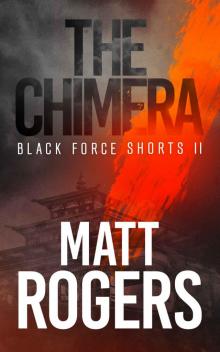 The Chimera: A Black Force Thriller (Black Force Shorts Book 2)
The Chimera: A Black Force Thriller (Black Force Shorts Book 2)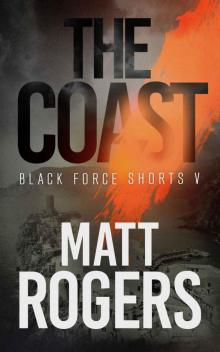 The Coast_A Black Force Thriller
The Coast_A Black Force Thriller